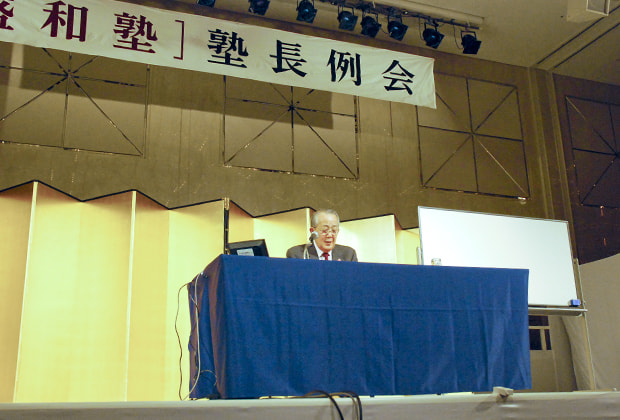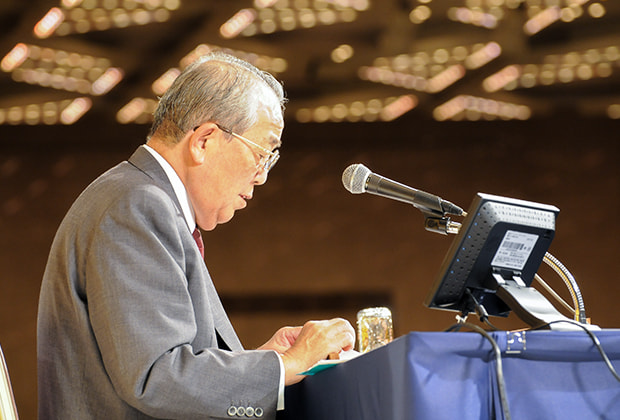Lectures
“Leadership Ideals from Nanshu Saigo”

Inamori has read Nanshu-o Ikun many times, which elucidates the ideas of Nanshu Saigo, a highly esteemed hero from Inamori's home prefecture of Kagoshima. Nanshu-o Ikun has provided important guidelines for Inamori in life and in management.
This section introduces a lecture Inamori gave on the theme "Learning about the Ideal State of a Leader from Nanshu Saigo", during the Seiwajyuku Kanto Region Jyukucho Meeting of December 11, 2007.
To sustain success, control desire
I founded Kyocera in 1959. While continuing my work ever since, I have witnessed the ups and downs of many business managers. When launching a company, they prepare for all kinds of hardship, striving and struggling to turn their company into something great. However, when the company actually does become great, success triggers decline.
Why does this happen? Because turning inward to self-interest is part of our human nature. But once we acknowledge our innate propensity for this, people in positions of authority have a responsibility to practice moderation, to control their selfish desires, and thereby work to prevent success from tipping into decline.
Kyocera's management is based on the spirit of "Respect the Divine and Love People"
As an ancient Chinese proverb states, "One person can raise a nation; one person can destroy it." Similarly, it has been said from olden times that the success or failure of an organization or group is determined by the leader. What manner of person must a leader be? Let us consider the question based on the thinking of Nanshu Saigo.
When I started Kyocera, I had no idea what criteria to use for making decisions in management. I soon decided that my decision-making criteria would be, "What is the right thing to do, and what is wrong?," as I was taught by my parents and teachers as a child. "What is right as a human being" is what Saigo refers to as "Divine." Through the words "Respect the Divine," Saigo explained the importance of following the right path.
Later, on the occasion of a protest by employees in the third year after I founded Kyocera, I set "To provide opportunities for the material and intellectual growth of all our employees" as the goal of the enterprise. I subsequently recognized the second part of Saigo's expression as well, "Respect the Divine and Love People," which advocates a broad love for people in general.
Encounter Nanshu-o Ikun, and learn the importance of selflessness

Nanshu-o Ikun, a collection of the ideas of Nanshu Saigo, explains at length the ideal state of a leader. The introduction states that a person standing at the top and taking the Divine road (as in "Respect the Divine") must suppress even the slightest thoughts of self-interest.
When the person at the top follows their individual interests, the organization will perish. Nanshu Saigo teaches that only people who are able to think constantly about what is best for the organization, people who are willing to sacrifice themselves, should be in leadership positions.
Appoint leaders who have the character and qualities appropriate for the post
Further, Nanshu Saigo asserts that the worst step to take is to give someone a position they cannot fulfill effectively, regardless of past distinguished service. For a position of importance, select and appoint only a person who has the character and qualities appropriate for the post. Acknowledge, reward, and esteem other people of distinguished service with honors and compensation.
Remain humble
In the 26th passage of Nanshu-o Ikun, Nanshu Saigo begins by warning us not to esteem ourselves too highly. Business managers become proud of themselves because of their achievements, and this leads to the deterioration of the company. How does this sound? "I have worked hard and long. Because of my abilities, the company has grown and is listed on a stock exchange. All of this is due to my talent. Therefore, I deserve lavish compensation."
I took this as a personal warning and made the words "Remain humble" my personal motto. Regardless of Kyocera's success and development, I have endeavored to work earnestly at my job to this day.
Eschew the temptations of life, fame, position and money
The concept of "selflessness" pervades the ideas of Nanshu Saigo. Being fair-minded and eliminating personal interest ― this selfless attitude is the most important element of a leader.
If you do not have the courage to set aside personal interest and risk placing yourself at great personal disadvantage, then you must not be a leader. The opening of the 30th passage in Nanshu-o Ikun states Saigo's thinking most clearly as, "a person who needs not life, not fame, not position or money." I believe this type of person, above all others, has the ultimate qualification for leadership, and can lead us through the current social and economic fog.
Use no tricks

The 7th passage of Nanshu-o Ikun warns against using deceptions, tricks or plots to gain a business advantage, ever, regardless of circumstances, however great or small ― and to walk always the path of righteousness in absolute sincerity.
This teaching reminds me of the founding of DDI. Having considered many plans and strategies, everyone was at a standstill and hesitating because the business appeared exceedingly difficult. However, we then elevated our pure desire to "Serve the greater good of humankind and society" to the level of a creed. Later, among the startup telecom companies of that era, DDI, which maintained steady and earnest effort, was the only company that survived and prospered. As English philosopher James Allen wrote around the start of the 20th century, pure and high-minded thoughts hold wonderful latent power.
Develop unshakeable will through adversity
Simply having knowledge of the Nanshu-o Ikun teachings is meaningless. 'Knowing' and 'being able to apply' are entirely different. Anyone can acquire knowledge, but unless you raise knowledge to a level that stirs the soul, it remains useless.
As Saigo described in the 5th passage of Nanshu-o Ikun, human beings experience continual trials and hardships. Unless one experiences the process of overcoming each as it emerges, one's philosophy, thinking and will remain unsound. Once we decide to overcome, we must appeal repeatedly to our inner soul, and truly make our thinking an integral part of our being.
Notable Quotes from This Lecture
Here are some excerpts from what Inamori expressed in this lecture.
A person who leads a group and intends to take the "Divine" road must not entertain any thoughts of self-importance.
Through steady effort, an ordinary person can transform into someone extraordinary. Even someone who exhibits no particular talents may, through 30 years of wholehearted dedication, be transformed into someone of uncommon ability. People who are renowned as being accomplished in their fields have often spent many decades in the pursuit of one objective and refined themselves in the process.
A graduate of a leading university, with an excellent academic record, will not necessarily achieve greatness in the world. It is the accumulation of effort, continuously applied over a long time, which develops the individual. Therefore, we must value those with whom we have experienced highs and lows. These people form the foundation of our company. Neglect the foundation, and you will never build a great enterprise.
When the company does well, many managers quickly become elated. They become arrogant, believing success resulted from their own abilities. Ultimately, the company crumbles. "Remaining humble" after achieving success is vital.
Whether a corporate manager, a politician or a bureaucrat, the higher you rise, the more essential it is for you to take the lead and practice self-sacrifice. Unless you are prepared to set aside self-interest, and have the courage to sacrifice more than your subordinates, you should not be leading others. Simply put, you are not qualified to stand above others. When someone who does not have the courage of self-sacrifice stands above, the people below will suffer.
All human beings have self-interested desires. Acknowledging such desires, controlling them wherever possible, and becoming fair and disinterested is, in my view, the ideal. Because you have become a leader, you need to consider your employees before thinking of yourself. This is precisely the same as the mother who is willing to go hungry so her children may eat. This exemplifies the "Selfless Mind."
From the Seiwajyuku Kanto Region Jyukucho Meeting (December 11, 2007)

